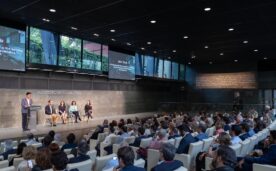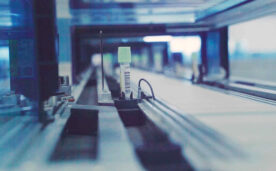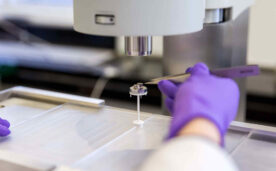The Chair in Science and Society of the Rafael del Pino Foundation prepares the report Ten technologies to boost Spain. Under the supervision of Professor Javier García Martínez, the Chair's team drafts an annual document that identifies the ten emerging technologies that offer a competitive advantage to the Spanish economy and society.

The report Ten technologies to boost Spainis an analysis and foresight work led by the Rafael del Pino Foundation professor Javier García Martínez. The team that produces it is made up of Fernando Gomollón Bell y Eugenio MallolThe journal is also responsible for editorial co-ordination. It is supported by a committee of experts made up of 15 leading figures in science and technology, who contribute their experience and expertise in various fields.
This report on ten technologies to give Spain a competitive edge does not seek to disseminate the latest and most striking innovations in the field of research, but rather to recognise those science and technology-based initiatives that are in the process of being incorporated into economic activity, by connecting their innovative nature with a high degree of maturity in their development and application.
They are currently members of the Committee of Experts:
María José Alonso Fernández. Editor-in-Chief of the journal Drug Delivery and Translational Research (DDTR). Former President of the Controlled Release Society (CRS). Principal Investigator, CIMUS Research Institute, University of Santiago de Compostela (USC). Professor of Pharmacy and Pharmaceutical Technology at the USC.
Pablo Artal Soriano. Doctor in Physics and Professor of Optics at the University of Murcia. Founder of the technology-based company Voptica. Chairman of the Physics panel at the State Research Agency. National Research Award 2018
María Blasco Marhuenda. PhD in Biochemistry and Molecular Biology. Director of the Spanish National Cancer Research Centre (CNIO). National Research Award 2010.
Lina Gálvez Muñoz. MEP (Vice-Chair of the Committee on Industry, Research and Energy. Member of the Committee on Women's Rights and Gender Equality and the Panel for the Future of Science and Technology). Professor of Economic History and Institutions, Department of Economics, Pablo Olavide University (Seville).
Laura Lechuga Gómez. Research Professor at CSIC (GENCAT-CSIC-UAB), Head of the Nanobiosensors and Bioanalytical Applications Group at ICN2 and CIBER-BBN. National Research Award 2020.
Nuria Oliver Ramírez. Director of Data Science Research at Vodafone. Chief Data Scientist Data-Pop Alliance. Co-founder and scientific advisor to the Ellis Foundation for Artificial Intelligence.
Manuel de León Rodríguez. Mathematician and Doctor in Mathematical Sciences. Research Professor at the CSIC and Academician of the Royal Academy of Exact, Physical and Natural Sciences. Founder and Director of the Institute of Mathematical Sciences (ICMAT).
Susana Marcos Celestino. Director of the Visual Science Center at the University of Rochester. Research Professor and Director of the Visual Optics and Biophotonics Laboratory at the CSIC Institute of Optics. Vice-President of the Scientific Advisory Committee of the State Research Agency. National Research Award 2019.
María Ángela Nieto Toledano. Research Professor at the Institute of Neurosciences (CSIC-UMH) in Alicante, member
of CIBERER and President of the International Society for Developmental Biology (ISDB). National Research Award 2019. Credits Report 2022
Andres Pedreño Muñoz. Professor of Applied Economics, former Rector of the University of Alicante and former CEO of Universia.
Héctor Perea Saavedra. Industrial Engineer. Former Director of Strategy and Business Development at CEPSA.
Emma Fernández. Telecommunications engineer and MBA. She has developed her professional career in the technology sector in leading companies such as Telefónica, Alcatel and Indra. In the latter she was General Manager between 2006 and 2015.
Javier Ventura-Traveset Bosch. PhD in Telecommunications Engineering. Director of the Scientific Office of Satellite Navigation and Executive Secretary of the Scientific Advisory Committee of the Galileo programme of the European Space Agency (ESA), Spokesperson in Spain for ESA and member of the Royal Academy of Engineering of Spain.
Fernando Temprano. PhD in Chemical Sciences and Master in Business Administration. From 2007 to 2017. He was director of Repsol's R&D and technology division, with global responsibility in this area.
Francisco Marín. Partner of CONEXO and Chairman of the Advisory Board of the consulting firm AYMING. He combines these professional activities with the Vice-Chairmanship of the CEOE's R&D&I Commission, as Honorary Member of COTEC and Vice-Chairman of the Innovative Companies Forum. In 2020 he received the National Award for Innovative Trajectory.
-

Javier García urges to put the "high beams on" and increase the "speed" of change at the presentation of 'Innovation with a Future'.
The presentation event of the work "Innovation with a Future", which includes the report on technologies to promote the transformation of Spain prepared by the Rafael del Pino Chair in Science and Society, was attended by María del Pino, President of the Foundation, Antonio Garamendi (CEOE) and Javier García Martínez, Director of the Chair,...
-

0. Introduction Intec 2023: the decline of the pyramids, governing the ecosystems
Both the economy and the provision of public services are evolving towards a new software-enabled model, which implies higher update rates and the need for more public-private collaboration in problem solving. In Spain, the low level of penetration of key technologies in our productive fabric is serious,...
-

1. Generative AI in search of business models
The explosion of generative artificial intelligence leaves open questions about the availability of information, the business models and use cases that will really justify its application in the economy and, of course, the ethical implications of its generalisation.
-

2. The awakening of intelligence in textiles
The impact of textiles on the planet, especially the environmental cost of the production of raw materials and the waste derived from them, forces us to rethink their function and their capacity to last, as a way to facilitate a change in consumer habits.
-

3. mRNA vaccines, the new paradigm
Vaccine development has undergone a qualitative shift with the emergence of messenger RNA-based solutions during the pandemic and the effects will also be felt in personalised therapies - it is time to pave the way for an explosion of innovation.
-

4. Digital fire extinguishers
Boosting innovation and investment in the prevention phase is one of the tasks ahead in tackling one of the most dramatic consequences of climate change, while improving the availability and processing of data.
-

5. Reinventing the way we inhabit our homes
From new materials to the circular economy and, of course, the digital revolution: the way we build and the refurbishment of existing building stock has become an avenue for innovation that integrates many sectors.
-

6. The quantum revolution, on the verge of exploding
The promise of the second quantum revolution is already on the horizon, but to make it a reality, innovation challenges such as those related to materials and their availability or device design must be overcome.
-

7. A technological shield for all-out cyberwarfare
The protection of digital assets and critical infrastructure has not only become a challenge for the economy, but will shape the ability of individuals to exercise their freedoms and of democracies to function without constraints.
-

8. Intelligent diagnostics, technologies for anticipating life
Healthcare systems will undergo a huge transformation as the confluence of digital technologies, genetics and photonics enables earlier diagnosis of diseases and even real-time monitoring of people's condition.
-

9. The heartbeat of 5G private networks
New connectivity technologies, such as 5G-6G and Wi-Fi 6e-Wi-Fi 7, will drive automation on a scale never seen before, and pose an innovation and business model challenge that the regulatory framework must help solve.
-

10. The new face of nuclear energy
The race for Small Modular Reactors (SMRs) is on around the world and could determine the competitiveness of economies as well as their contribution to reducing CO2 emissions and producing green hydrogen.


